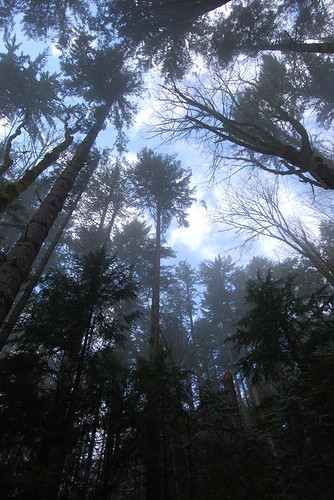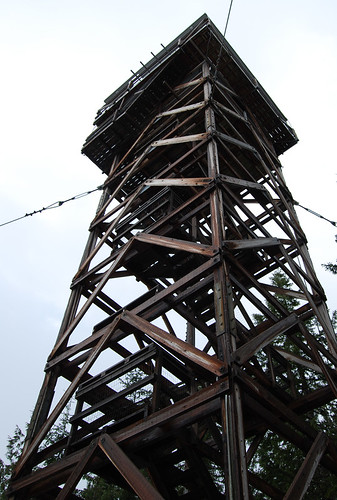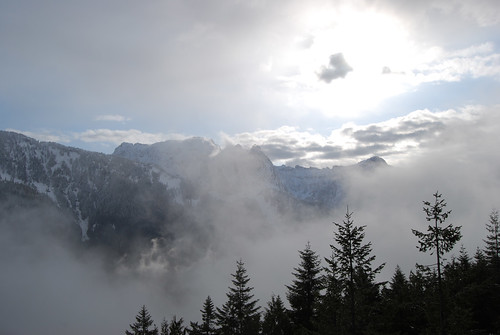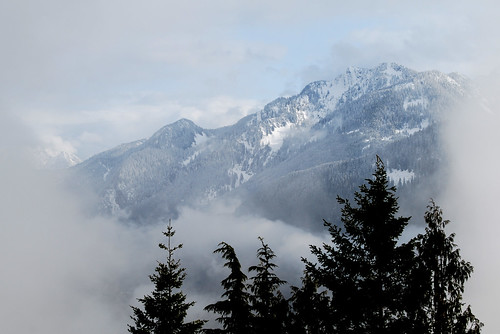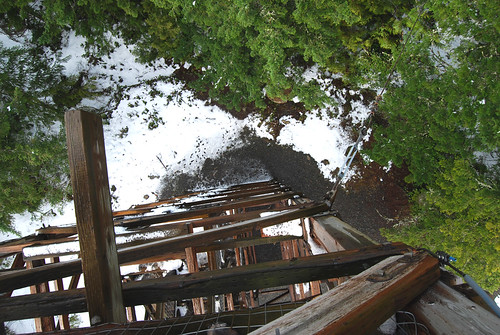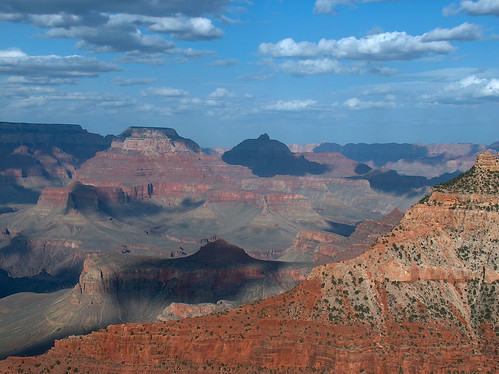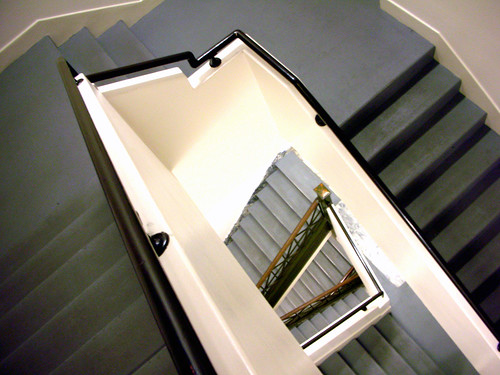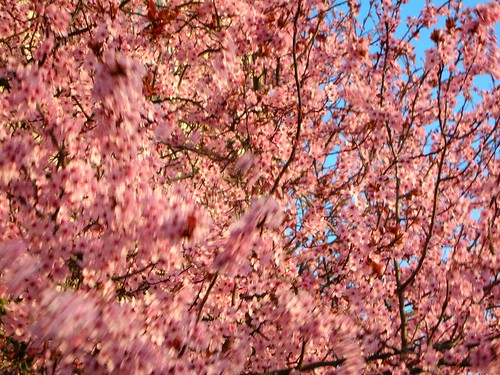
Today is the Holy Day of Zhaké, God of Rivers, the wisest and greatest god of Them all! And this time I mean it, really!
He is spectacular. He is magnificent. He is Zhaké!
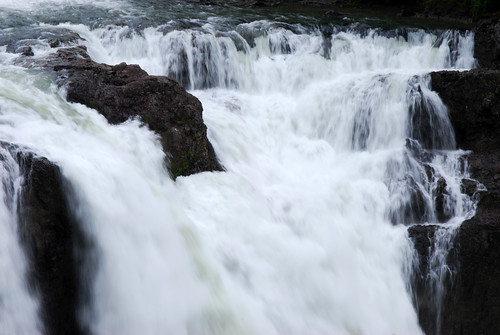

Since the early days of the universe, Zhaké lived high in the mountains, sculpting and nurturing the very rock to build the mountains high and huge. He had the form of a goat with horns like crab claws, leaping from peak to peak. Zhaké made the mountains as tall as possible, the better to capture the rain and snow to feed His rivers. He enjoys the solitude, but keeps a close watch on all of us mortals.
Far back before humanity existed, however, when only gods walked the earth, Zhaké was one of the new gods. The eldest gods, Kérasa, High Goddess of Water, and Hívo, God of Clean Water, didn't much like the new gods running around, being noisy, and actually doing stuff. Hívo grew so incensed that He vowed the destruction of all the gods -- except Kérasa and Him, of course. Hívo started by attacking Rékaré, God of Rock and the noisiest of Them all.
Hívo had rage on His side, which fueled Him well, but Rékaré had skill. The rock god deflected every blow, but Hívo never stopped. Eventually, Zhaké decided He had to do something. Rékaré was losing ground and Hívo’s rage was not abating. Soon He would kill Rékaré and then attack the others.
Bounding down from His mountains, Zhaké grabbed Hívo from behind and quickly through Him deep underground. There, far beneath the mountains, Zhaké trapped the water god, confining Him in solid rock. All the gods thanked Zhaké profusely for saving Them, but Zhaké realized that, with Hívo gone, clean waters were uncontrolled. Zhaké immediately took over these responsibilities, caring for the water from its source in the clouds, down the streams and rivers, to the salty sea.
Along with acquiring Hívo’s duties, Zhaké also took part of His form, now having a serpent's scaly tail instead of hind legs. Now Zhaké could not only leap from mountain to mountain, but swim the lengths of His magnificent rivers. In fact, He also swam out into the sea, taming the wild waves and transforming the chaos into the great ocean river encircling the world.
Soon thereafter, Zhaké married Ríhíví, Goddess of Hot Springs and Mother to the Gods. As one would expect from the husband of a great mother, Zhaké was a prolific father. Besides fathering all the rivers and a variety of gods and demigods, Zhaké also had one fathering experience that no one -- especially the river god -- will soon forget.
While Zhaké slept, His son Névazhíno, God of Animals, thought up an intriguing idea that appeared good on the surface. Unfortunately, Névazhíno is as foolish as His father is wise. Névazhíno crept up to Zhaké in His bed and stole some of His fathering fluid from His body. Zhaké did not wake. His son took the seed water over to the nearest river and planted it along the banks, assuming great things would grow.
Great things did indeed grow. Wondrous trees erupted from the soil, bearing the most marvelous fruits that one ever did see. As tart as an apple yet as sweet as a huckleberry, and as juicy as a flowing river, and yet Névazhíno did not allow anyone eat them till His father arrived.
When Zhaké awoke and spotted the new fruit trees, He thanked His son and ate heartily. In fact, He devoured the trees' supply completely. Thus satisfied, Zhaké retired to a mountaintop to contemplate the universe. Up on the peak, Zhaké noticed a swelling in His jaw. At first, He thought He had eaten too fast and hurt a tooth, but then He began swelling elsewhere on His body: His shoulder, His hand, His chest, His forehead, His back, His legs.
Shocked and dismayed, Zhaké hurried to His wife, Who was a skilled healer. Ríhíví studied the strange growths, stroked Her chin in contemplation, but could not figure it out. Zhaké considered what He had done differently recently and soon thought about His foolish son, Névazhíno. Gifts from fools are seldom as good as they first appear.
Zhaké cornered His son and demanded to know the origin of the fruits. Névazhíno crumbled easily and told Him what He had done. Wise Zhaké quickly made the connections: the fruits contained Zhaké’s own seeds and thus He had impregnated Himself! Since He didn't have a womb, the seeds had grown in His body anywhere and everywhere they could find.
After smacking Névazhíno over the head, Zhaké had Ríhíví transfer the growths to Her womb, so the seeds could grow and develop. She did this and soon Ríhíví gave birth to a whole passel of demigoddesses, one from each swelling in Zhaké’s body. To this very day, these demigoddesses assist Ríhíví as She heals others, each of them specializing in the part of the body from which she came: the one who grew in Zhaké’s jaw is highly skilled in jaw injuries; the one who grew in Zhaké’s back is well-versed in healing backs; and so on. When next you pray to Ríhíví for you health, ask also for the help of one of Zhaké’s daughters and she will gladly aid you, for you worship her father.
While Zhaké and Ríhíví spent Their time on peaceful ventures such as this, the other gods fought for dominance. After Zhaké had saved Them from Hívo, generation after generation overthrew Their elders and took over control of the universe. As long as They did not threaten others, however, Zhaké remained separate and apart.
After Sozho, High God of Air, conquered the universe from His father, He granted the sea to His brother, Vasataté, God of Oceans. Zhaké gladly let the younger god take responsibility of the navigable seas, for Zhaké much preferred the rivers and the great ocean river beyond the horizon. The tame seas were never as intriguing to Him as the distant, exotic waters around the world.
It was round about this time that Zhaké released Hívo from below the mountains, for the ancient god had finally calmed down significantly and was no longer a threat to the other gods. Also not long after Sozho’s ascension -- at least it wasn’t much time for the gods -- mankind was created by Zhíanoso, High God of Fire.
With fewer water-related responsibilities, Zhaké took an interest in the mortals. Zhíanoso graciously let Zhaké help His creations, for Zhíanoso was soon to become Zhaké’s son-in-law. Zhaké did not abuse this relationship, of course, but treated the mortals with utmost respect.
Zhaké taught the human beings crafts such as woodwork, pottery, and metalwork. He taught them trade, farming, and architecture. He encouraged creativity and intelligence, of which He dared to see more in mankind than other gods cared to look for. With Zhaké’s help, mankind flourished. We spread across the landscape, cultivating fields and building cities. Humanity prospered under Zhaké’s tutelage. Civilization was formed.
The King of the Gods, however, didn’t like it. Sozho thought man was too noisy and prolific -- and He would never appreciate anything created by Zhíanoso -- so He set about to destroy us. Much as Zhaké had protected His fellow gods from the rampaging Hívo, Zhaké defended mankind.
Sozho sent Hérazha, Goddess of Wind, to blow man from the face of the earth, but Zhaké easily deflected Her hurricanes with His high mountains. Sozho then sent Huro, God of Thunder, but Zhaké caught His lightning on His peaks and collected all of Huro’s rain into His rivers. Next came Sívorí, Goddess of Stars, Who pelted the cities with meteors. Zhaké saved as many as He could in His mountain caves, but countless mortals died from the fiery falling stars.
Both saddened and enraged at the destruction, Zhaké was not entirely prepared when Pétíso, God of Death, arrived at the scene. Mortals were falling dead left and right with just a glance from Pétíso. Zhaké had no defense against this attack. Soon only one large family remained, shielded from Pétíso by Zhaké’s body.
While Zhaké blocked the God of Death, He directed the family build an enclosed boat and all climb in. Before Pétíso could tear the boat apart to get at the last of mankind, Zhaké pushed the boat into the river and carried them swiftly away. Pétíso couldn’t keep up with the flow of the river as Zhaké swam behind the boat, propelling it downstream on the crest of a giant wave. Zhaké carried the surge all the way across the ocean to a distant land where humanity could once again flourish, away from the destructive wrath of the other gods.
Carried on the giant wave, the boat settled atop a high mountain. When the family opened the door and peered out upon the new land, Zhaké greeted them, told the bad news about the rest of humanity, and set about teaching them to build another civilization. By the time the mortals once again attracted the attention of Sozho, Zhaké had calmed Him down. A constant, scheduled supply of nubile young demigoddesses worked wonders to satisfy the high god’s sexual appetite.
While Sozho was busy, Zhaké continued to teach the mortals the ways of the universe. He also taught them of their own mortality, something which was a new concept to Him, a god. Zhaké would measure their lifespans and, for those who would listen, told them of their coming personal demise. Because of this, the human beings began to refer to Zhaké as the Piercer, for He seemed to pierce their hearts with His prophecies of their deaths. But it is not Zhaké who kills us. Our deaths are preordained by fate. He merely informs us of our future, if we care to hear.
So listen to Zhaké and learn your fate. Trust in His wisdom and He will show you great things. Trust in His strength and He will defend you. He is the Protector of Mankind, the wisest god of all, the magnificent Zhaké.

